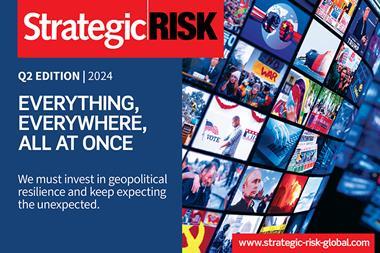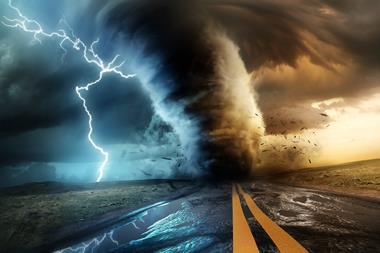In a highly polarised world, could natural catastrophes - such as last year’s Hurricane Zeta - tip the geopolitical balance?
The UK and Europe enjoy a certain comfort when it comes to catastrophe risk. Straight-line wind, hail, and winter storm don’t come as frequently as they do in the US. And they don’t cause nearly the damage of hurricanes and tropical storms. Earthquake risk is limited to certain parts of the Continent – generally areas with smaller potential economic impact.
So, it’s easy to look at Hurricane Zeta in the US last October (and note the impact it almost had on the country’s presidential election) as a concern for the other side of the Atlantic Ocean, except perhaps as it could impact US foreign policy, currency and foreign exchange, and trade, among other issues.
Or, instead, there could be local lessons to learn.
On a knife’s edge
Political and socioeconomic volatility have increasingly become the norm in developed markets around the world. Although the riot and civil disorder seen in the US didn’t replicate with scale overseas, there are plenty of signs of polarisation, instability, and political risk. And that’s enough to make you wonder what could happen if a catastrophe event occurred near an election.
With that in mind, let’s take a closer look at Hurricane Zeta. The storm shot through Georgia on 29 October 2020 – only five days before the US presidential election. That, in itself, is a rarity.
Over 18 presidential elections since 1952, PCS has found only nine catastrophe events in October (or the November days before an election) that were anywhere near large enough for consideration.
Without a broad, subjective view of ‘significance’, Superstorm Sandy would probably be the only catastrophe worth considering, and it hit states where election outcomes were generally quite wide. The broader view of significance adds 1964, 1968, 1996, 2016, and 2020 to Sandy’s 2012.
What made Hurricane Zeta interesting was its timing and its storm path. In addition to Georgia, it passed through North Carolina, which also became a tightly contested state in the presidential election. The two together could have, in some circumstances, determined the outcome of the election. Had the hurricane been as impactful as those of 2017, the situation could have been far different.
Remote doesn’t mean impossible
Hurricane Zeta showed a unique pairing, according to an analysis by PCS. It hit a state (Georgia) that ultimately had both a rate of claims per voter above one percent, and a gap between the candidates of less than one percent. It is the only time this has happened in at least 70 years.
North Carolina, impacted by the same storm, had a claims-per voter rate of below one percent and the delta between the candidates was 1.3 percent. No other state has come close.
In 2012, Superstorm Sandy led to claims-per-vote rates of above one percent. In fact, New Jersey’s was nearly 15 percent, and New York’s was close to 8.5 percent. However, both states had double-digit percentage differences in the votes secured by the two major party candidates. The same was true in several other states affected by Sandy, including Connecticut, Delaware, Massachusetts, Maryland, and Rhode Island.
Pennsylvania showed a claims-per-voter rate of over two percent, a relatively high outcome in our analysis. And the vote difference was just under 5.5 percent – a fairly low single-digit result, but still not material in evaluating election risk from catastrophe events.
The sheer paucity of historical events itself suggests that the risk of an election-shaping catastrophe event is remote. That said, Hurricane Zeta should serve as a reminder that remote doesn’t mean impossible.
The Louisiana effect
What happened in Louisiana as a result of Hurricane Zeta could be insightful. The storm was a major event, resulting in a claims-to-voter rate of 7.24 per cent. That’s almost six times greater than the rate seen in Georgia. If Georgia had experienced that same rate, the state’s total estimated claims from Hurricane Zeta (as measured by PCS), would’ve swelled from less than 70,000 to more than 350,000.
Using claims from the catastrophe as a proxy for local disruption, you can get a sense of how a major catastrophe in Georgia could have affected the election’s outcome.
While the need for the US to learn from the latest close call is clear, there are also lessons for the rest of the world. Given the role of the United States in global economic, political, and social activity, it’s crucial to understand how a turn of events in Georgia or Louisiana could affect trade, aid, or diplomacy just about anywhere on the planet.
Additionally, the direct experience could be applied closer to home. The UK and Europe may experience catastrophes that are generally milder than the worst sustained by the United States, but that doesn’t mean such events couldn’t threaten election activity.
After all, we just saw last year how a pandemic could impact every corner of our lives. In the post-2020 risk reckoning, it’s crucial that we take a look with fresh eyes at what a natural catastrophe could mean for elections.
Tom Johansmeyer, ARM, is head of PCS, a Verisk Business




















No comments yet